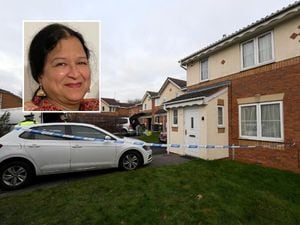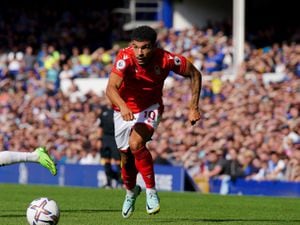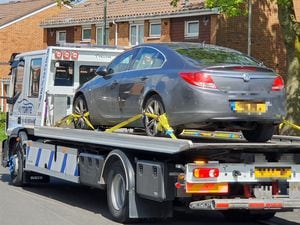Molineux crowds roar for Last Lion Churchill
A crowd of 25,000 people, big enough to fill the Molineux, hanging on the Conservative leader's every word - it is a sight David Cameron could only dream of.
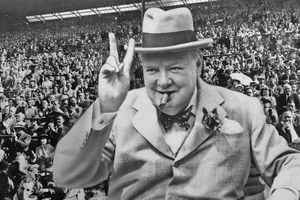
But that is what greeted Sir Winston Churchill at Wolves ground in July 1949 as he set out the Tory party's plan to win back power after one term in opposition to Labour.
The parallels between now and then are easy to find in eight minutes of footage from the speech.
Mr Churchill, as he still was then prior to his knighthood, talked of the Conservatives setting 'the right road for Britain'.
It is a very similar argument to that made by the Coalition Tories of today as they try to persuade people they are the ones putting the country on 'the road to a stronger economy'.
And the man dubbed the Last Lion told of how under Labour the country's gold reserves had plummeted, warning there would not even be the resources to import the raw materials to keep factories open.
Fifty years ago today, nine days after slipping into a coma, Sir Winston Churchill died at the age of 90.
His funeral would become the largest ever state send off in history up to that point, with delegates from 112 nations and around 350 million television viewers.
As a leader of the opposition, Labour's Ed Miliband could today only dream of commanding a 25,000 strong audience for a speech on the economy.
The wartime Prime Minister was 10 minutes late because of the delay in his plane touching down at Wolverhampton Airfield.
The waiting crowds did not hold it against him. They broke through the police barriers to pat him on the back and cheer him.
He had been to the town hall in the morning, now the site of the city's magistrates court, and had gone for lunch at the Victoria Hotel when there was a sudden rush by the crowd.
The Express & Star reported on July 23 1949: "The leading people, patting him on the back, shouted 'good old Churchill' and 'good old Winston', but they were soon controlled."
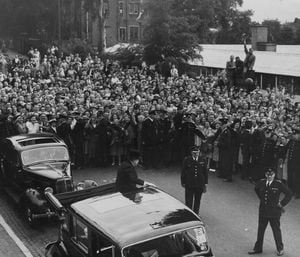
It added: "Easily the first thing to be seen was Mr Churchill's familiar profile; hat on head and a newly lit cigar in his mouth.
"The sun was shining and the lawns in front of the aero club house were gay with the summer dresses of the women, mostly wives of members, for entrance to the airfield was strictly controlled."
Children were waving Union Flags as the plane taxied to a stop.
The route to the town hall, along what is now the A449 Stafford Road, was 'thickly lined with Wolverhampton people'.
As he drove along Mr Churchill stood up in the back of his open car and took off his hat to wave at the crowd.
Large crowds swarmed around the town hall for a glimpse of Mr Churchill as he got out of the car and walked up the steps, stopping at the time to wave and make his famous 'V' sign.
Not everyone was happy to see him, however.
Members of Wolverhampton's Labour Party handed out a leaflet written by their agent W Justyn Jones containing speeches made by Mr Churchill between 1908 and 1948. The pamphlet read: "When you have read this you will understand why it is that sensible people vote Labour."
The day after his passing, the Express & Star recalled an earlier visit made to Wolverhampton by Churchill.
During the 1906 election he visited a relative who was standing as a candidate. He was so anxious to hear the results he came to the Express & Star office to get them as early as possible.
"While there he pulled up a chair and assisted the harassed sub-editors by putting up headlines and re-writing paragraphs to such effect that the chief sub-editor said afterwards: "It's a pity Winston is a politician. He would have made a darned fine sub-editor."
He also came to Wolverhampton in 1909 during the stormy days of the suffragette movement.
Protesters marched up and down Lichfield Street, picketing the front of the Grand Theatre where a meeting was taking place.
"But all in vain," reported the Express & Star, "For a motor car drew up suddenly at the back of the theatre, several men got out, walked slowly up to the stage door and disappeared within.
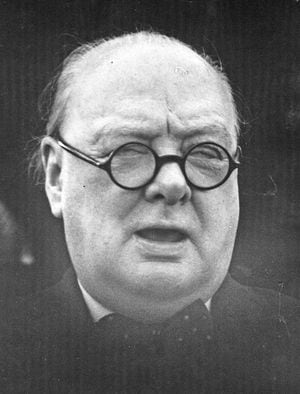
"Among them was a pale-faced stooping figure, looking like a curate. It was Winston Churchill."
He had also addressed crowds at Himley Hall in 1928.
As Chancellor he had told crowds, again tens of thousands strong, about how a petrol tax would stimulate scientific development of British coal.
But in his speech in Wolverhampton 21 years later he was seeking a return to government after the Tories were thrown out by Clement Attlee's landslide Labour victory of 1945.
He announced that that morning the party had published a document entitled The Right Road For Britain.
"This sets forth a simple statement of the Conservative, or Tory, because we're not ashamed of the word, outlook and aims as applied to the current politics of this difficult and critical time."
He described the then upcoming General Election as one of the most difficult that will ever have taken place.
"We are as our chairman has reminded us, rapidly approaching a grave and formidable event," he said.
"The last golden dollar reserves of the Sterling area, for which this country is responsible, are running out.
"The government have frequently insisted that £500 million is the very minimum required.
"They assured us they would not let our reserves fall below this level.
"Now we are suddenly told that they are down to £406m.
"These, ladies and gentleman are the last reserves that stand between us and insolvency.
"We shall not be able, even with the existing American subsidies, to import enough raw materials to keep our factories busy and our people at work. Or enough food to maintain our health and strength, physical strength.
"Widespread unemployment and more privations are inevitable unless this catastrophe is averted.
"Whoever inherits from the present regime will have a skinny and a sour inheritance.
"Nationalisation depresses the status of the worker.
"Our object is to enhance it.
"We intend to humanise, rather than nationalise industry.
"In the workers charter, which we adopted in 1947, we offered security, incentive and status to the individual.
"We wish to see the widest possible extension of joint consultation between management and workers. Though this must be done on a voluntary basis.
"Nothing is more clear than to say it here on this beautiful afternoon in Wolverhampton. Nothing is more clear than that nationalisation spells the doom of trade unionism. This is already the case in totalitarian states where the trade union is used not for the purpose of obtaining redress for workers grievances but to make them come along as quietly as they will before socialist or soviet measures have to be enforced.
"I have no difficulty this afternoon in declaring once again what is the Conservative party should we be successful when the appeal to the people is made.
"We shall immediately repeal the act for nationalising steel should it reach the statute book.
"And we shall restore to the great mass of insurance policy holders the certainty that they will not be robbed or cheated of the fruits of their thrift."
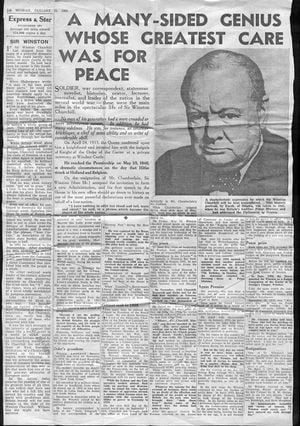
He said the Tory party's motto was 'of the people, by the people, for the people'.
"Unity and freedom are the beacons which shed their light around its future path. What we do here on the day of electoral trial will not only determine the course of British history but will influence profoundly the immediate future of the world."
Half a century on from Churchill's death and 75 years since his 'finest hour' in leading the fight against fascism, commemorations will be held in the UK and abroad throughout 2015 to celebrate his achievements and his impact on the world today.
On January 30 - the 50th anniversary of his state funeral - a remembrance service will be held in London at the Houses of Parliament in recognition of his unswerving dedication to the nation.
Members of Churchill's family will also take part in a flotilla on the River Thames along the same route his funeral took.
Joined by The Havengore, the vessel which carried his coffin, the flotilla will sail from Tower Bridge to the waters opposite the Palace of Westminster, where a wreath will be laid in Churchill's honour. A ceremony will later be held at Westminster Abbey.
Normandy veteran Joe Davies, now 91, was 21 when he landed on Gold Beach in Arromanches with the 12th Royal Army Service Corps in June 1944.
Five years later, Churchill came to Molineux, by which time Joe was serving with the police.
"What I really remember about him is from when I was in the army and he was our Prime Minister," said Mr Davies, of Compton.
"I was proud to have served with him as our commander.
"When he won the 1951 election I was a PC on motorbikes. I was delighted to have him back."
Arthur Jones, aged 88, from Solent Close in Pendeford, Wolverhampton, spent 18 months until the end of the war driving a tank from France to Germany with the 147 Essex Yeomanry, Eighth Armoured.
He said: "People remember him very fondly now but at the time he was very heavily criticised.
"If it wasn't for Churchill things would have been very different.
"He was the leader we needed at that time.
"His speeches filled you with hope and the belief that as a country, we could do anything."


